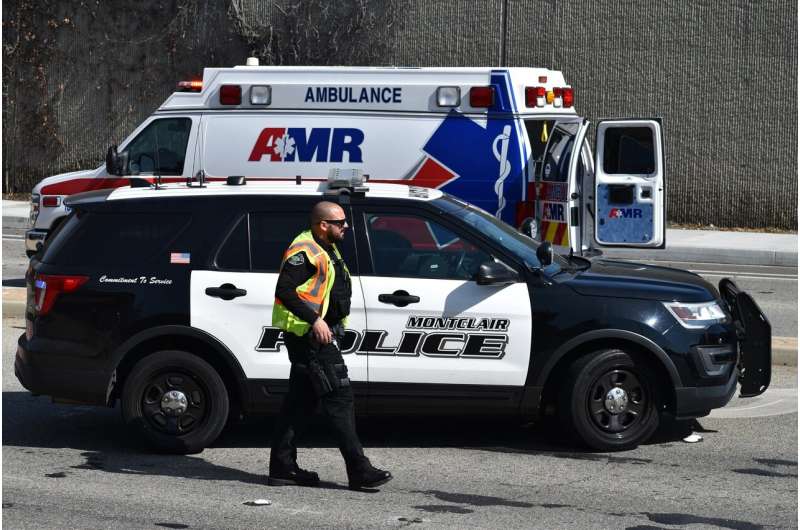This article has been reviewed according to Science X's editorial process and policies. Editors have highlighted the following attributes while ensuring the content's credibility:
fact-checked
trusted source
proofread
Documenting the experience of police, paramedics responding to people affected by methamphetamines

Researcher and nurse Dr. Rikki Jones, from the University of New England's School of Health, has documented the experiences of both police and paramedics responding to people affected by methamphetamines in the first study of its kind in Australia. The revealing findings, published in the journal Nursing & Health Sciences and International Journal of Mental Health Nursing, highlight the complex safety issues they face in the fraught hours before hospital admission.
Dr. Jones, who has spent the past five years investigating the impact of crystal methamphetamine (or ICE) use, is now calling for more research and safer, better coordinated protocols to be considered.
"The number of methamphetamine callouts is increasing and police officers and paramedics are on the frontline of these medical and mental health crises," she said.
"There are the drug-related side-effects, which can include aggressive and psychotic behavior, but also the personal distress associated with having engaged in criminal behavior to sustain their addiction and families being at breaking point. People who use drugs often have little or no social support.
"Drug addiction is an illness that requires treatment and respect for the patient. A more coordinated model, involving police, paramedics, drug and alcohol services, and mental health staff, could improve patient care pre-hospital. This is especially important for rural and regional centers, which often don't have the same level of facilities, services or staff."
According to the Australian Institute of Health and Welfare, although the reported consumption of methamphetamine has declined, it still accounted for 12,400 hospital admissions in 2020-21. The number of deaths involving methamphetamines and other stimulants also grew fourfold between 2000 and 2020.
One police officer told Dr. Jones of being called to a man affected by methamphetamines who required three police and two security officers to be restrained before being admitted to hospital. On another occasion, the same officer was met by a man exhibiting "bizarre behavior," wielding a machete and threatening his family.
"You don't know what's going to happen when you attend a house with someone who has been on meth," the police officer reported.
In another episode, a paramedic described a dangerous standoff with a man that involved 10 police cars and special operations officers, when the individual became so aggressive he was tasered twice and bitten by a police dog.
Dr. Jones said methamphetamines are a highly addictive stimulant and use is linked to mental illness and psychosis, including hallucinations, depression and anxiety.
"My interviews with first responders revealed that many meth users require physical restraint and chemical sedation during highly charged and unpredictable situations that rapidly escalate into violence," she said. "Many are not just suffering from ice intoxication; they are also under the influence of other drugs and alcohol. Police and paramedics will often co-attend a scene in an effort to minimize the risks because they are fearful for their own safety and that of their co-workers."
However, Dr. Jones's landmark reports suggest that the care environments in which methamphetamine users find themselves can often be unsuitable.
"Ambulances are generally not the best vehicles to transport patients in because there is a lot of equipment within reach that can be used as a weapon," Dr. Jones said. "Keeping people in police wagons in ambulance bays for safety reasons is not in the patient's best interests either. When a person is brought in to an emergency department, it's a bright, highly stimulated environment, which often increases their anxiety and agitation, when what they generally need is a quiet place to come down off the drug and rest.
"Frontline workers suggested that new national safety protocols for how they co-attend a scene and transport patients are needed. A combined mental health nurse and police approach has been successfully trialed in some states and we may need to consider designated vehicles for mental health and drug and alcohol presentations, as well as quiet mental health safe hospital rooms for patients. That pre-hospital situation and emergency department (ED) admission needs to be better integrated."
Such protocols could pose a challenge in rural and regional areas, which have fewer (especially mental health and addiction treatment) resources and security staff, and where dealing with methamphetamine users can tie police and paramedic staff up for hours on end.
One paramedic went so far as to say that many psychotic and "horrifically strong" patients are being taken "to the wrong place."
"We are 100 percent treating it wrong," the paramedic reported, "we should be taking them to a mental health-specific ED."
Dr. Jones said admission to an ED may be the first opportunity for a patient to seek help in managing their addiction.
"So we need to get this right," she said. "Drug use and methamphetamine violence can be hiding other things like domestic and family violence, relationship breakdown, social upheaval or personal distress. Appropriate mental health or drug and alcohol support can help entire families at risk, and first responders are in a prime position to make referrals.
"We need to work out how to better respond to the effects of different drugs and these ever-changing presentations to ensure we are able to provide safe, effective care to our patients and protect the staff who are responding and providing emergency care."
More information: Rikki Jones et al, "Complexity, safety and challenges: Emergency responders' experience of people affected by methamphetamines", Nursing & Health Sciences (2022). DOI: 10.1111/nhs.12978
Rikki Jones et al, Social issues, crisis, and care coordination: First responders experience responding to people affected by methamphetamines, International Journal of Mental Health Nursing (2023). DOI: 10.1111/inm.13119


















